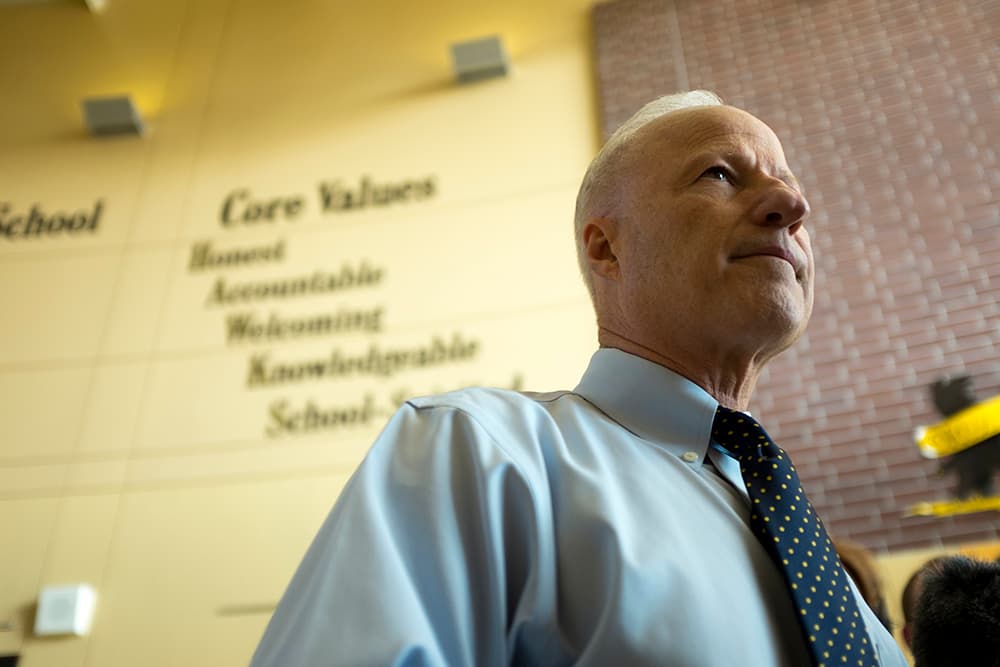Net neutrality is the idea that internet service providers should treat all content, websites and applications the same, without preferential treatment for those who can pay more, and it's under threat.
The Federal Communications Commission is widely expected to repeal the 2015 order that guarantees net neutrality, and it's become a largely partisan issue. On Tuesday, U.S. Rep. Mike Coffman of Aurora became the first Republican to say the FCC should delay its vote so that Congress can act instead.
"The Internet has been and remains a transformative tool, and I am concerned that any action you take may alter the rules under which it functions and may well have significant unanticipated negative consequences," Coffman wrote in a letter to FCC Chairman Ajit Pai.

Gizmodo notes that a small number of Republicans have criticized the proposal to overturn net neutrality or called for legislation to make it harder to revoke, but Coffman is the first Republican to ask that the FCC not vote on Thursday.
As of Wednesday morning, Coffman wasn't making a lot of headway.
Earlier this year, Coffman was one of just 15 Republicans to vote against the repeal of FCC rules that prevented internet service providers from selling consumers' personal information.
If you've heard about the net neutrality debate but have a hard time imagining the impact, these metaphors collected by Marketplace are useful:
A world without net neutrality would be like UPS delivering packages from Amazon faster than ones from Walmart. It would be like a freeway with a special lane for Hondas but not Toyotas. It would be like your mother serving Thanksgiving dinner faster to your brother than to you. It would be like a taxi service that picked up some passengers quicker than others and drove slower to some destinations than others.
Why would internet service providers do that? Consumerist (may its memory be for a blessing) explains how it works under current rules:
Absent these rules, you could, for example, see situations where a company like Comcast, wishing to promote its own streaming TV service, slows down competing services like Netflix or Amazon Prime enough that it frustrates you to use them. Or Comcast could simply speed up its own services so that everyone else looks like crap in comparison. Or it could charge Netflix or Amazon more for “fast lane” access to reach you — or charge you more for the same.
Current net neutrality rules were adopted in 2015 under the Obama administration. The FCC voted to reclassify broadband as vital telecommunications infrastructure. That's what gave the FCC the authority to enforce its rules, which include (again, Consumerist):
Broadband providers may not block access to legal content, applications, services, or non-harmful devices.
They may not impair or degrade lawful internet traffic on the basis of content, application, services, or any classes thereof.
They may not favor some internet traffic over other internet traffic in exchange for consideration of any kind — no paid prioritization or fast lanes.
Pai is a long-time opponent of net neutrality. He argues that it stifles innovation and investment, though ISPs themselves tell investors that net neutrality hasn't hurt them, as Ars Technica reported earlier this year.
Pai was elevated to commissioner by the Trump administration back in January. His proposal would return broadband to the category of "information service," as well as preempt state laws that would protect internet consumers.
A final vote on that proposal is set for Thursday, and with a Republican majority on the commission, it's expected to pass.
In asking the FCC to delay this vote, Coffman quoted Pai's own words back in 2014.
A dispute this fundamental is not for us, five unelected officials, to decide. Instead, it should be resolved by the people’s elected representatives, those who choose the direction of government — and those whom the American people can hold accountable for that choice.
At the time, Pai was arguing against the FCC adopting net neutrality rules when he was in the minority. Earlier this year, Democratic Commissioner Mignon Clayburn also highlighted these words by Pai, as Consumerist reported.
Evan Greer, campaign director for Fight for the Future, an advocacy group, told Gizmodo that the legislative option is a "solution in search of a problem" because existing FCC rules already provide the necessary protections and a lengthy court battle ended in 2016 with a ruling in the FCC's favor.
“Net neutrality is not a partisan issue outside of Washington, D.C.,” she said in a statement emailed to Gizmodo. “Voters from across the political spectrum don’t want their cable companies controlling what websites and apps they can use, or where they get their news from. Republican lawmakers like Mike Coffman can see the writing on the wall.”
A recent poll conducted by the University of Maryland’s Program for Public Consultation and Voice of the People found that a large majority of Republican as well as Democratic voters want to preserve net neutrality, Gizmodo reported.
In his letter, Coffman said the regulations supported by previous FCC chairman, Republican and Democratic alike, "have given the nation a highly successful and popular space notable for free markets, free expression and for the tremendous growth in the Internet economy."
This story has been updated to include a new tweet from Coffman.
Want more Denver news? Subscribe to Denverite's newsletter here.












